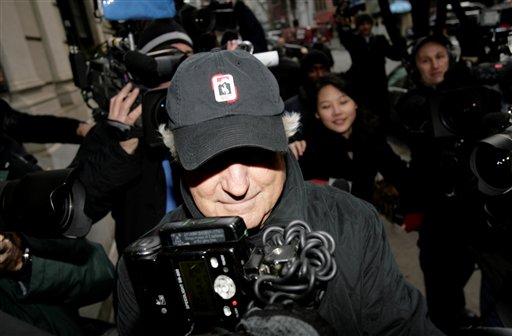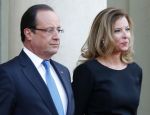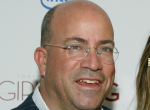If you robbed a bank and got caught, you would go to jail. If you waited in the getaway car while your cohort robbed the bank, you would go to jail as an accomplice, right? Of course you would. That’s what the law mandates.
Videos by Rare
So how come, after a bank stands mute as customers are robbed, do they get “deferred prosecution?”
I ask these questions after this week’s decision by the feds to merely fine JPMorgan Chase for failing to report their very real suspicions about mega-fraudster Bernard Madoff. No criminal charges, no one is held responsible and faces jail time — just $2.5 billion in fines and penalties for an organization that experts say will likely make as much as $23 billion in profit this year.
Under the settlement agreement, announced by the U.S. Attorney in Manhattan, any criminal charges were deferred for two years — and maybe forever if the bank keeps its nose clean. All JPMorgan had to do was admit its bad conduct, pay the fine and agree to strengthen its anti-money laundering policies.
JPMorgan immediately issued a statement saying, “We recognize we could have done a better job pulling together various pieces of information and concerns about Madoff from different parts of the bank.” Really?
Pulitzer Prize-winning business reporter Michael Hiltzik, writing in the Los Angeles Times, declared the JPMorgan admission, “Resembles hay after it’s been passed through the digestive system of a horse.” Hiltzik also believes JPMorgan has re-written the history of what it knew about Madoff’s criminal practices — and when they knew it.
“JPMorgan, where Madoff kept his major bank accounts and which profited handsomely off its relationship in numerous ways, knew Madoff was crooked. Bank executives had him figured out … early,” Hiltzik wrote.
Look, I don’t know much about high finance, but let’s review some facts about what JPMorgan did — and didn’t do — after it had reason to believe Madoff was a conman of mammoth proportions.
Keep in mind the Bank Secrecy Act of 1970 requires banks to file what’s called “suspicious activity reports” with federal regulators if they think a customer is dealing in ill-gotten gains. JPMorgan consistently stayed mum about its Madoff concerns and, under the law, that is a felony.
In October 2008, the bank’s branch in London apparently saw great financial doom looming and finally registered their concerns about Madoff with British regulators. While required to file the same report in the U.S., JPMorgan did not. Over the next few weeks, the bank quietly withdrew some $300 million of its own money invested in various Madoff funds. By December, Madoff was in handcuffs, paraded as a master Ponzi perp before his horrified investors — and the world.
In other words, JP Morgan never lifted a finger to help protect clients, but when it came to protecting itself against risk, bank executives made sure they were ahead of the curve.
JPMorgan executives likely consider the just-imposed $2.5 billion fine as simply the cost of doing business. Over the last year the organization has agreed to pay out a collective $20 billion for various serious banking violations.
Imagine if you robbed a bank of, say, $1 million, and prosecutors agreed to let you pay $1,000 to make the criminal charges go away. Being able to pay away your crimes would never happen with an individual, but when it comes to financial institutions, the legal playing field is suddenly different. Why is that?
Because our Department of Justice says that’s OK.
Remember the days when prosecutors actually came to the aid of cheated investors to punish those responsible? The days when charlatan convicts actually went to prison and names like Mike Milken, Ivan Boesky, Jeffery Skilling and Charles Keating made the news?
Today, swindlers such as former Countrywide Financial Services CEO Angelo Mozilo — a man widely considered to have been a kingpin of the sub-prime mortgage crisis — can walk away from the financial messes they create by simply opening up their fattened wallets. Mozilo was four days away from the opening of his criminal fraud trial when the Security and Exchange Commission suddenly dropped the charges in exchange for his payment of a $67.5 million fine.
That’s justice? Is it any wonder so many Americans have grown distrustful of both the federal government and big institutions? This is why so many citizens have come to believe that there are two justice systems in this country — one for the average citizen and one for those with money and connections.
While watching the U.S. Attorney’s news conference announcing the latest settlement, I couldn’t help but notice not one word was said regarding the federal government’s failure to monitor Madoff’s years-long misdeeds. Certainly the bank was wrong, but where had the SEC, the FBI and other government agencies been all those years that Madoff was scamming people? If someone as blatant as Madoff slipped through the cracks, how many other financial fraudsters are operating unnoticed today?
There seems to be no end to the number of fingers of blame that can rightfully be pointed. Yet, hardly anyone has been held personally responsible for the myriad of financial crimes we’ve seen over the last few years.
U.S. District Court judge Jed Rakoff recently wrote a brave essay about Wall Street’s watchdogs. Rakoff, who has an expertise in securities law, wrote that exacting fines and promises to do better from institutions is, “little more than window dressing,” and he lambasts the shift in DOJ policy toward negotiating with companies.
“Companies do not commit crimes,” the judge wrote. “Only their agents do … So why not prosecute the agent who actually committed the crime?”
Is anyone at the Justice Department listening?
© CREATORS.COM



